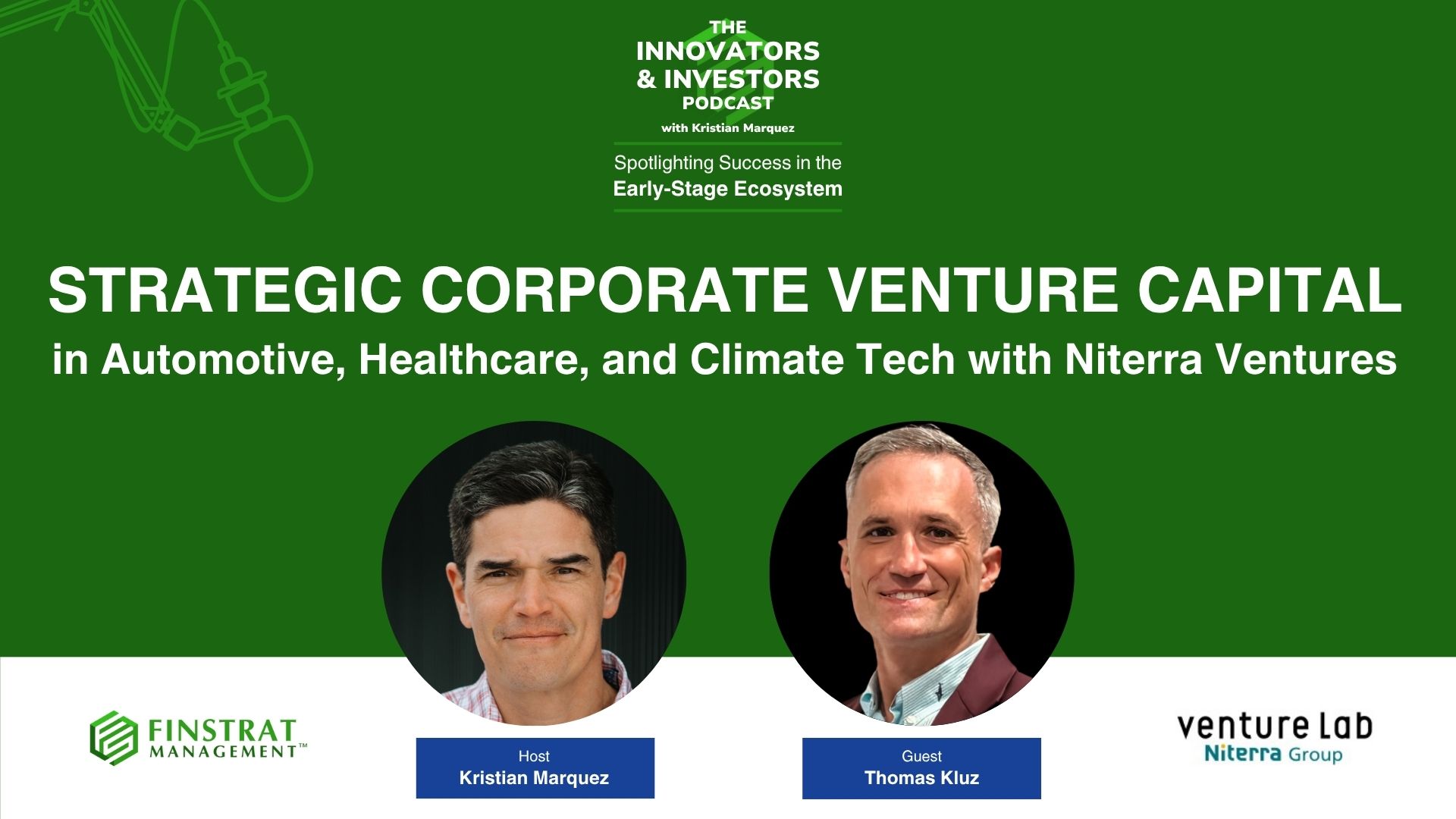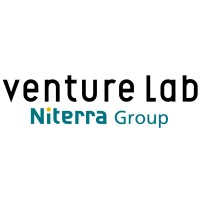Strategic Corporate Venture Capital in Automotive, Healthcare, and Climate Tech with Niterra Ventures
July 25, 2025 | 35 MIN

Highlights
- Niterra Ventures focuses investments on automotive adjacencies, healthcare, and climate tech to diversify beyond traditional automotive markets.
- Healthcare investments emphasize respiratory care and advanced wound care technologies, including innovative cold plasma and synthetic skin products.
- Climate tech is a growing priority, targeting energy, air, and water purification startups.
- The firm employs a disciplined, three-stage due diligence process emphasizing strategic fit, unique competitive advantage, and management team quality.
- Tom stresses the importance of recurring revenue, customer acquisition costs, and realistic growth projections in assessing startups.
- AI is leveraged internally for productivity and evaluated carefully in investments, focusing on vertical applications solving specific problems.
- Tom’s operational experience as a founder informs a founder-friendly investment approach grounded in empathy and respect for entrepreneur time.
Summary
In this episode of the Innovators and Investors Podcast, host Kristian Marquez interviews Tom Kluz, Managing Partner and Head of Investments at Niterra Ventures, the corporate venture capital arm of Niterra Global—a leading automotive supplier. The conversation explores Niterra Ventures’ investment thesis, portfolio focus, strategic approach, and Tom’s career background. Niterra Ventures invests primarily in three sectors: automotive adjacencies, healthcare (especially respiratory and advanced wound care), and sustainability/climate technology. The firm’s strategy involves minority investments to acquire strategic assets that align with Niterra’s evolving business model as the internal combustion engine market declines. Tom shares insights from his extensive venture capital career, including prior roles at Qualcomm Ventures and Providence Ventures, and his experience as a startup founder. He emphasizes the importance of balancing financial returns with strategic value creation, a disciplined and staged due diligence process, and a deep focus on unique competitive advantages in portfolio companies. The discussion also covers Niterra’s investment structures, criteria for evaluating startups (including metrics like recurring revenue and customer acquisition costs), and the role of AI both internally and in their portfolio. Tom reflects on lessons learned, such as the value of embracing failure early in one’s career, and encourages entrepreneurs and investors to focus on meaningful problem-solving rather than chasing hype. The episode concludes with contact information for Tom and a recommendation for a future podcast guest.
Key Insights
- Strategic Diversification in Response to Market Shifts: Niterra Ventures’ investment thesis is largely driven by the recognition that the traditional internal combustion engine market is shrinking due to the rise of electric and alternative-fuel vehicles. This foresight has pushed the firm to strategically diversify into automotive adjacencies, healthcare, and sustainability sectors. By doing so, they aim to build new core competencies and revenue streams that will sustain Niterra’s growth well into the future, illustrating how corporate venture arms can align investments with long-term corporate transformation.
- Healthcare as an Underfunded Opportunity with Tangible Impact: The firm’s focus on advanced wound care, particularly technologies like cold plasma and synthetic skin, highlights a niche yet impactful area in healthcare that is often overlooked by investors. These innovations not only improve patient outcomes but also offer cost benefits to clinicians and payers, demonstrating how strategic corporate investors can identify and nurture solutions that create systemic value in healthcare.
- Emerging Emphasis on Climate Tech Reflects Corporate Responsibility and Market Potential: Although still building its climate tech portfolio, Niterra Ventures’ active pursuit of startups in energy and environmental purification sectors signals an alignment with global sustainability trends and regulatory pressures. It also underscores corporate VC’s role in fostering technologies that may become critical for future business models and societal impact.
- Disciplined Due Diligence Balances Financial and Strategic Objectives: The firm’s three-stage diligence process—starting with strategic fit, moving to assessing unique competitive advantages (UCA) across product, intellectual property, and management quality, and concluding with confirmatory legal and financial checks—reflects a rigorous approach designed to minimize risk and maximize alignment with corporate goals. This layered process exemplifies best practices in corporate venture capital, ensuring investments generate both financial returns and strategic value.
- Focus on Sustainable Business Models with Strong Unit Economics: Tom’s emphasis on metrics such as recurring revenue, customer acquisition costs (CAC), and lifetime value (LTV) illustrates a pragmatic, data-driven approach to evaluating startups. Seeking a minimum LTV:CAC ratio around 3:1 and validating growth projections against market feedback helps avoid overvalued or unsustainable businesses, an especially important stance in markets impacted by hype cycles such as AI.
- Pragmatic Approach to AI Investment and Usage: The conversation reveals a nuanced view of AI, favoring vertical, problem-specific applications over broad, horizontal AI hype. Internally, AI is used to enhance productivity and global team communication, while in investment decisions, the firm looks for AI as an enabler rather than a gimmick. This reflects a growing maturity in the venture ecosystem, where meaningful AI integration is valued over buzzword-driven pitches.
- Operational Experience Enhances Investor Empathy and Founder Relationships: Tom’s background as both an entrepreneur and operator informs a founder-centric investment philosophy. He is mindful of the burdens that due diligence can impose, strives to limit unnecessary founder interruptions, and respects the challenges of scaling a business. This empathy can lead to stronger partnerships and better outcomes, highlighting the advantage of investors who have walked in founders’ shoes.
- Corporate Venture Capital Fund Structure Enables Flexibility and Conviction-Based Scaling: Niterra Ventures’ model of having both a dedicated early-stage fund and off-balance sheet capital allows it to make smaller initial investments and then double down on companies with proven potential. This staged investment strategy balances risk and reward and enhances strategic alignment, showing how corporate VCs can leverage internal capital structures to optimize portfolio outcomes.
- Global Team and Remote Engagement Reflect Evolving Venture Practices: While pre-pandemic norms favored face-to-face meetings with founders, Tom acknowledges the current realities of remote work and global investment mandates. The team’s distributed presence in the US, Europe, and Asia helps maintain relationships and diligence rigor without always requiring in-person meetings, reflecting the changing dynamics of international venture investing.
- Strategic Alignment Can Lead to Passing on Attractive Financial Deals: Unlike traditional financial VCs, Niterra Ventures sometimes rejects financially promising deals if they lack clear strategic relevance, underscoring the dual mandate that corporate VCs face. This discipline ensures that capital is deployed where it can drive both portfolio returns and the parent company’s future capabilities, though it adds complexity to deal selection.
- Realistic Growth and Pricing Models Are Key to Assessing Market Potential: Tom’s example of an authentication technology startup illustrates the importance of evaluating not only initial contract size but also the scalability and pricing expansion potential. This “land and expand” model is critical for companies targeting large markets and seeking to evolve from niche solutions to major revenue contributors.
- Career Advice Highlights the Importance of Embracing Failure and Risk Early: Reflecting on his journey, Tom advises his younger self to avoid sweating the small stuff and to embrace failure as a learning opportunity. This perspective encourages founders and investors alike to take calculated risks and understand that setbacks are part of growth, a vital mindset in the innovation economy.
- Open and Accessible Networking Style Encourages Broad Engagement: Tom welcomes cold emails and emphasizes the value of warm introductions but remains approachable to entrepreneurs and investors reaching out independently. This openness fosters greater connectivity in the venture ecosystem and demonstrates how accessibility can enhance deal flow and partnership opportunities.
Conclusion
Tom Kluz insights from Niterra Ventures offer a compelling blueprint for corporate venture capital in a rapidly evolving industrial landscape. By combining rigorous financial discipline, strategic foresight, operational empathy, and a focus on meaningful technology solutions, Niterra Ventures exemplifies how corporate investors can not only generate returns but also drive transformational change within their parent companies and broader markets.
Stay up-to-date with Tom Kluz and his work with Niterra Ventures.
Follow the show on your podcast channel of choice or listen below.




